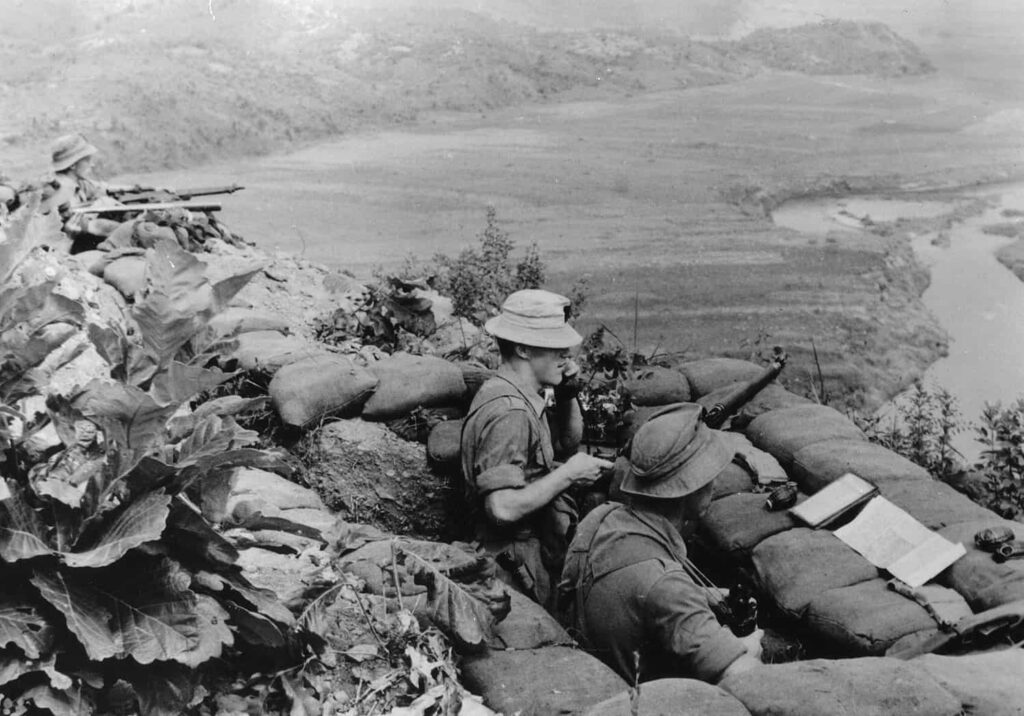
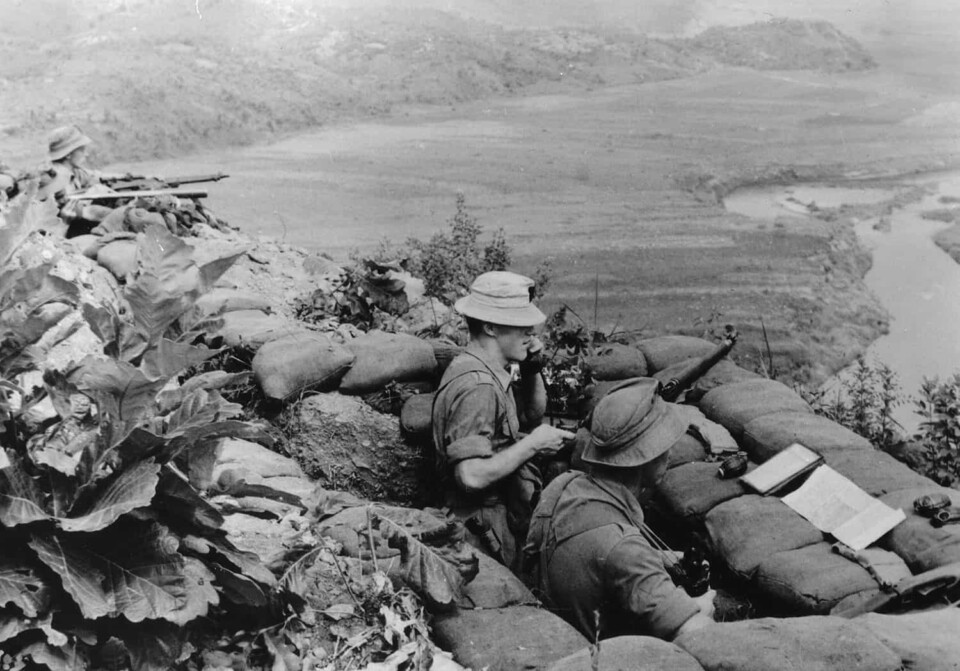
After the war, 6th and 7th Battalions were disbanded in 1946, and 2nd Battalion in 1947. From 1945 to 1947 1st Battalion was posted on internal security duties in Palestine and in 1951, now with National Servicemen on its strength – was posted to Korea.
The too often neglected war against the Chinese and North Korean was hard going and fought in extreme climatic conditions. On the night of 4th/5th November 1951 the Battalion was holding a position on a narrow, ridge in the Kowang-San region. Throughout the day the soldiers had been subjected to a concentrated barrage of shell and mortar fire, and, as night fell, the Chinese infantry advanced an entire division of 6000 men. The positions of the forward companies were overrun, but the Battalion stood its ground, and repulsed the Chinese attack. No less than 31 Borderers were killed with 90 being wounded and 20 made Prisoners of War. Over 1000 Chinese had been killed. Private Bill Speakman was awarded the VC for his part in the battle, and 2nd Lieutenant. William Purves received the DSO – the only National Service officer to have won that honour.
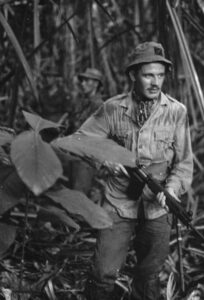
In Malaya during the similarly neglected Emergency from 1955 to 1959, 1st Battalion was in the jungle, fighting ruthless Communist terrorists of the MRLA Malayan Races Liberation Army. The KOSB operated from Batu Pahat and a forward base Tac HQ at Yong Peng. One of the key roles in the jungle was that of the dog handler. There were 21 dogs in the Malayan jungle trained to scent the enemy. The tactic was hugely successful. By the end of their two and a half year tour 1 KOSB had killed 8 terrorists, wounded some others. There are 22 recorded contacts but that is not illustrative of the everyday war of nerves.
From 1962 to February 1964 the battalion was on internal security operations in Aden and in May 1964 was fighting Yemeni insurgents in the Radfan Mountains. In the following year the battalion was posted to Borneo, patrolling the Malaysia-Indonesia border.
Action during the 1970s, to late 1990s was principally centred around Operation Banner, the British Army’s ongoing peacekeeping duties in Northern Ireland.
From 1970 onwards, 1 KOSB spent a great deal of time in the province, principally in Belfast, Armagh and Fermanagh, and latterly at Omagh with the last tour being from 2004 to 2006.
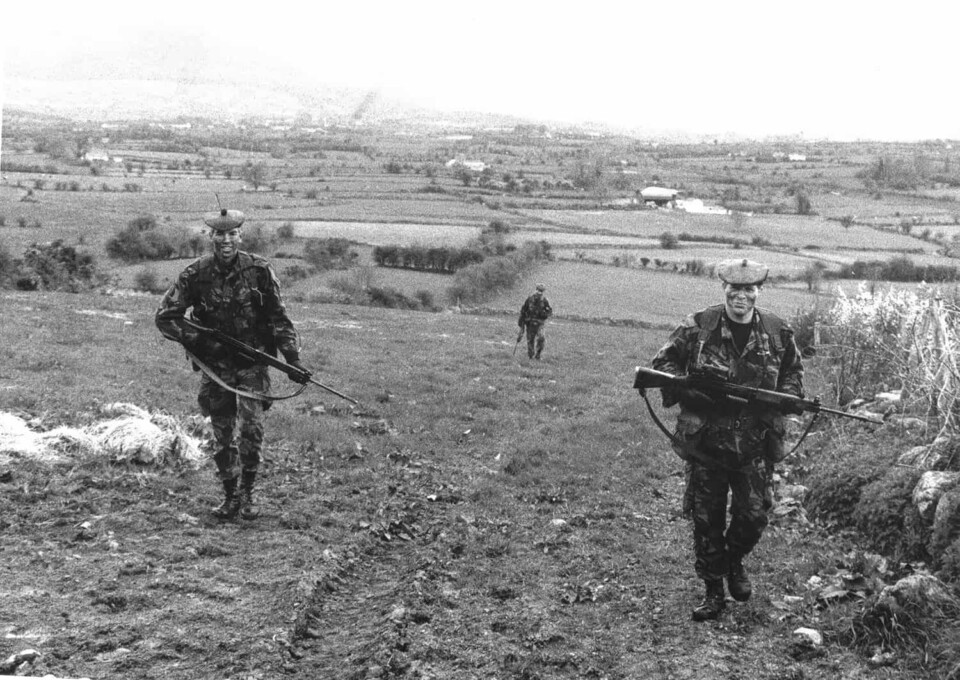
The most important action of these years was undoubtedly that at Derryard on the 13th December 1989. The Provisional IRA launched a major assault on the Derryard Permanent Vehicle Checkpoint near the Fermanagh-Monaghan border, which was manned by two teams from Support Company, 1 KOSB. The attack had been carefully planned, and was on a scale unprecedented in Northern Ireland. An armoured lorry smashed into the compound and twelve terrorists debussed attacking with Machine guns, gernadees and a flamethrower. They then drove in a , van containing a 400lb bomb. The Jocks inside the base were subjected to intensive fire. The command sangar was destroyed and the defenders suffered a number of casualties, in spite of which they remained calm and organised, attended to their wounded, and returned fire. They were reinforced by a returning security patrol, and after ten minutes of fierce close-quarter fighting, the terrorists were beaten back. Fortunately the bomb failed to explode. Two KOSBs lost their lives in the action and two of the defenders were awarded the DCM with one of the dead being mentioned in dispatches.
In addition during this period, the Battalion and detachments were involved in operations and exercises throughout the world, from Belize (1978) to Cyprus (1999-2001). The Regimental Tercentenary in 1989 was marked by a year of celebration and pageantry, culminating in an unforgettable Parade through Edinburgh on Minden Day.
On New Year’s Day 1991, with the Battalion on leave and key officers abroad, the order came to mobilise for service in the Gulf. Three weeks days later they were deployed as part of Operation Granby/Desert Storm and after training in Saudi Arabia moved into battle positions, crossing into Kuwait at the beginning of March. Their principal role was mopping up pockets of resistance and the processing and guarding of POWs and a new Battle Honour, ‘Gulf 1991′, was awarded.
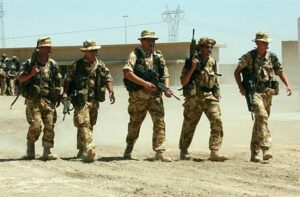
In May 2003 the Battalion was deployed again to southern Iraq in Operation Telic2 to help maintain law and order in the aftermath of the overthrow of Saddam Hussein. As well as providing a measure of security and stability in the Maysan Province, the battalion helped out in the frequent crises brought about by shortages of fuel, water and electricity, and in the general task of reconstruction.
There were constant fire fights with gangs of insurgents, and at the end of their tour in November 2003, the Battalion had added an OBE, a CGC an MC and five mentions in dispatches to the list of regimental honours and awards. It was also this campaign that saw the last Borderer to be killed in action, on 27 August 2003.
In March 2006, the regiment became The King’s Own Scottish Borderers Battalion of The Royal Regiment of Scotland. On the 1st August of that year, the Royal Scots and KOSB Battalions merged to form the Royal Scots Borderers, 1st Battalion, The Royal Regiment of Scotland (1 SCOTS).